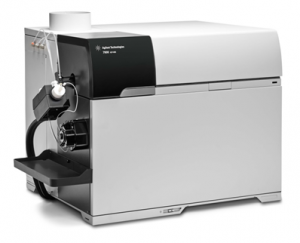 Inductively coupled plasma – mass spectrometry (ICP-MS) is an analytical technique used for elemental determinations of metals and several non-metals at concentrations as low as on part in 1012 (part per trillion). Compared to atomic absorption techniques, ICP-MS has greater speed, precision, and sensitivity, particularly for the rare-earth elements (REEs).
Inductively coupled plasma – mass spectrometry (ICP-MS) is an analytical technique used for elemental determinations of metals and several non-metals at concentrations as low as on part in 1012 (part per trillion). Compared to atomic absorption techniques, ICP-MS has greater speed, precision, and sensitivity, particularly for the rare-earth elements (REEs).
An ICP-MS combines a high-temperature ICP (Inductively Coupled Plasma) source with a mass spectrometer. The ICP source converts the atoms of the elements in the sample to ions. Once converted, they are brought into the mass spectrometer via the interface cones. The ions from the ICP source are then focused by the electrostatic lenses in the system into the mass spectrometer.
Once the ions enter the mass spectrometer, they are separated by their mass-to-charge ratio. The ability to filter ions on their mass-to-charge ratio allows ICP-MS to supply isotopic information, since different isotopes of the same element have different masses.
Once the ions have been separated, they must then be detected or counted by the detector. The fundamental purpose of the detector is to translate the number of ions striking the detector into an electrical signal that can be measured and related to the number of atoms of that element in the sample via the use of calibration standards.
If you would like to find out more about Mass Spectrometry or other technologies and services provided by American Assay Labs, please contact us and we’ll be glad to assist you with your goals.

